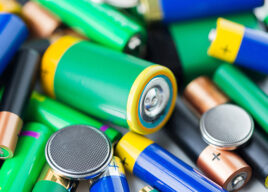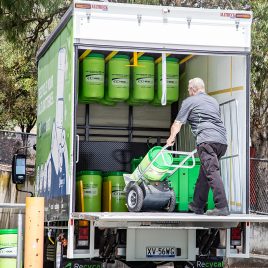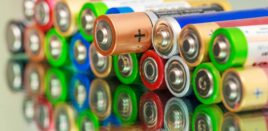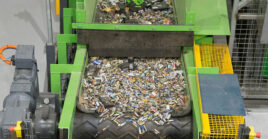

BATTERY RECYCLING - WORLDWIDE
Pioneering the Future: 10 Battery Recycling Startups Transforming the Industry
By Darren O’Donohoe, COO, Superfy, 13 February 2024
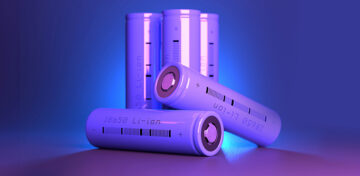
In today’s landscape, our reliance on batteries spans across diverse domains, from storing renewable energy sourced from the sun, wind, and water to powering the proliferation of mobile devices and remote sensors.
These batteries serve as the linchpin in enabling the viability of renewable resources by storing their energy for later use, facilitating the transition toward cleaner and more sustainable energy solutions. Simultaneously, the ubiquitous presence of mobile devices and the exponential growth of remote sensors in various industries underline the indispensable role that batteries play in our daily lives.
This dual necessity—balancing sustainable energy storage and powering our interconnected world—accentuates the critical need for innovative and eco-friendly approaches to battery recycling. Across the globe, numerous pioneering battery recycling startups are driving remarkable initiatives that redefine the boundaries of sustainability. Their endeavors range from material reclamation to establishing sustainable cycles in battery production.
This article highlights some of the leading organisations, dedicated to advancing sustainability in battery recycling.
![]()

1. Aqua Metals
It is one of the most innovative battery recycling startups creating waves in the market. Their revolutionary AquaRefining® process is a game-changer in the recycling industry. The technology recycles batteries using a water-based process without using any organic solvents. The process is one of the greenest and most economically viable ways to extract precious metals from batteries. Compared to the conventional smelting process, this technology produces significantly less toxic waste. The process reduces emissions and energy consumption as well, aligning with the global push towards sustainable practices.
Key information
Founded: 2014
Location: Headquarters: Alameda, California, USA
Market: Operates in the United States with potential plans for global expansion
Innovative Tech: AquaRefining® technology
![]()

2. Redwood Materials
Another promising startup in the battery recycling industry is Redwood Materials. The battery recycling company primarily focuses on recycling end-of-cycle batteries. The company uses a novel approach to reclaim up to 95% of materials from batteries, including nickel, cobalt, and copper. The reclaimed material is then repurposed to make battery materials like anode copper foil and cathode active materials. Redwood Materials has launched used battery collection programs in collaboration with major automotive companies like Ford and Volvo in California. These programs will facilitate the collection of end-of-life batteries, which are then shipped to Redwood Material’s plant in Carson City for recycling.
Key information
Founded: 2017
Location: Headquarters: Carson City, Nevada, USA
Market: Operates primarily in the United States
Innovative Tech: Recycling technology recovers over 95% of metals from batteries, producing anode copper foil and cathode materials
![]()

3. Ruicycle
A dynamic and innovative company, Ruicycle is the leading Asian startup in recycling. It mainly concentrates on devising new ways of handling waste materials, like plastics, electronic garbage, and industrial e-waste. A circular battery economy concept is inherent to this approach, which entails reducing, reusing, and recycling materials, not only waste processing. All of their technologies and processes aim to reduce environmental impacts and optimise resource recoveries and efficiencies. A major milestone for Ruicycle is the creation of a modern facility where cutting-edge techniques are used in sorting and processing operations. A wide-range waste treatment plant changes these wastes to reusable products and power. They customise their processes to minimise landfill use and reduce greenhouse gases, which contribute to environmentally friendly sustainability.
Key information
Founded: 2016
Location: Guangdong, China
Market: Primarily operates in China
Innovative Tech: High-tech recycling facilities focus on reducing, reusing, and recycling a variety of materials.
![]()

4. Superfy
Superfy’s Circular Economy Platform helps waste and recycling companies and corporates with Collections, Asset Tracking and Materials Processing. Enabling operational savings, transparency and efficiencies throughout the recycling collection and processing value chain. Headquartered in Dublin, Ireland, Superfy is making waves across Canada, USA, Europe, the Middle East and the APAC region.
At the heart of Superfy’s operation is an innovative software platform complemented by advanced sensors and smart containers. The technology is not just about tracking and monitoring waste and recycling materials; it’s about transforming the entire lifecycle of waste management—from bin to the truck to depot and recycling centre. The technology enables optimised collection logistics using fill-level monitoring, route mapping, real-time data, and full traceability. Similarly, Superfy is rapidly deploying sensors and smart bins worldwide, integrating software management portals and intelligent route planning. Superfy strives to enhance safety and sustainability in a bid to cut down on up to 40% of vehicle fuel collection and maintenance costs. It is accomplished through live tracking and reporting capabilities. These initiatives are geared toward conserving the environment and are key to sustainable, cost-effective waste disposal practices.
Key information
Founded: 2017
Location: Headquarters: Dublin, Ireland (DCU Alpha innovation hub)
Market: Operates globally with primary operations in Canada, USA, Europe, the Middle East and the APAC region
Innovative Tech: Superfy’s platform includes software, sensors, and smart containers for tracking and monitoring waste and recycling materials
![]()

5. Ecobatt
Ecobatt is a pioneer in battery recycling, leading the industry with its Australian-owned sorting and recycling plant, designed based on proven global battery recycling technology. The company runs the nation’s most comprehensive battery collection program, featuring over 5000 bins strategically placed in supermarkets across Australia. Their commitment to safety and reliability is reflected in a meticulously crafted recycling process that covers every step, from drop-off and pick-up to storage, sorting, and recycling. Drawing inspiration from best practices observed in leading battery recycling operations worldwide, Ecobatt maintains the highest standards of safety throughout its operations.
Key information
Founded: 1990
Location: Victoria, Australia
Market: Operates primarily in the Australia
Innovative Tech: State of the art sorting systems with robotic handling equipment ensure we operate efficiently and effectively. Modern dynamic collection system using Superfy technology.
![]()

6. Li-Cycle
Li-Cycle is a prominent startup in the battery recycling sector. It specialises in recycling used or scrap batteries by turning them back into their raw materials like Nickel, Lithium, and Manganese. The company uses a proprietary process known as ‘Spoke & Hub Technology,’ a non-hazardous, relatively inexpensive technology with minimal impact on the environment. This technology sets a high benchmark with an impressive recovery rate of over 95% of all battery-grade materials found in lithium-ion batteries. It includes the extraction of valuable elements such as lithium, cobalt, and nickel.
Key information
Founded: 2016
Location: Headquarters: Toronto, Ontario, Canada
Market: Operates in North America, mostly in Canada
Innovative Tech: Spoke & Hub Technologies, recycling with over 95% recovery rate of battery materials
![]()

7. Ascend Elements
Ascend Elements, a trailblazer in the field of battery recycling is elevating the value of the battery supply chain by manufacturing advanced battery materials from discarded lithium-ion batteries. The company is known for its revolutionary approach to battery materials production, aiming to create a clean and sustainable supply chain. Its operations focus on 100% battery recycling, returning all battery active materials back into the supply chain, and preserving critical materials for the batteries that power the clean energy revolution. Ascend Elements is well-regarded for its innovative Hydro-to-Cathode® and Hydro-to-Anode™ technologies. These patented processes produce new cathode and anode materials from spent lithium-ion cells more efficiently than traditional methods.
Key information
Founded: 2015
Location: Headquarters: Westborough, Massachusetts, USA
Market: Operates in the United States
Innovative Tech: Hydro-to-Cathode® and Hydro-to-Anode™ technologies, yielding over 99.9% pure graphite
![]()

8. Green Li-ion
Green Li-ion is one of the pioneering battery recycling startups focused on revolutionising the energy storage industry. Their unique approach involves fully remanufacturing spent Lithium-Ion batteries and waste. This innovative process not only addresses the increasing need for effective lithium-ion battery recycling but also contributes to the sustainability of the energy storage industry. The company’s market extends to remanufacturing spent energy storage material, aligning with global aspirations for environmental sustainability and efficient resource use.
Key information
Founded: 2020
Location: Headquarters: Singapore
Market: Operates mostly in Southeast Asia
Innovative Tech: Technology modules for full remanufacturing of Lithium-Ion batteries
![]()

9. Lithion Recycling
Lithion Recycling is among the leading companies that deal with the recovery of resources from discarded lithium-ion batteries. It is involved in the lithium-ion battery recycling and regenerating of components for making new chargeable batteries. The company also recycles different kinds of lithium-ion batteries, such as LCO, LFP, LMO, NCA, NiMH, and NMC, using its hydrometallurgy process. Unlike other companies that are based on combustion and pyrometallurgy, Lithion Recycling uses hydrometallurgical processes. The use of this technique makes it possible for the firm to reach up to 95% recycled battery materials, which plays an essential role in the sustainability of the battery supply chain.
Key information
Founded: 2018
Location: Montreal, Québec, Canada
Market: While it operates primarily in Canada, Lithion has multiple facilities in the pipeline for the United States, Europe, and Korea
Innovative Tech: Hydro-metallurgy technology allows for up to 95% recovery of precious metals from Li-ion batteries
![]()

10. Jae Young Technology
Jae Young Technology specialises in battery recycling. The startup has developed a unique technology for recovering high-purity lithium from used EV batteries, focusing on lithium waste and scraps remaining from secondary battery manufacturers. This innovation addresses a critical need in the growing battery recycling market, particularly with the increasing demand for lithium in various industries.
Key information
Founded: 2016
Location: Headquarters: Gumi, Gyeongsangbuk-do, South Korea
Market: Operates in South Korea
Innovative Tech: Technology for extracting high-purity lithium from used batteries

FAQs
Below are the answers to some frequently asked questions about battery recycling:
Is battery recycling profitable?
Battery recycling may prove to be profitable. Recycling used batteries is a source of materials like lithium and cobalt needed for newer electric vehicles. Recycling has the dual benfit of helping enhance the battery supply chain and it’s environmentally friendly.
What makes battery recycling difficult?
It is challenging to recycle batteries due to their varied chemistries and designs that range from lead-acid to nickel metal hydride and even lithium-ion. Extracting useful things such as lithium and cobalt can be difficult and expensive. Also, there is the challenge of sorting and transporting, which makes things more complicated.
Which type of battery is the most easily recyclable?
Lead-acid battery packs are the most easily recyclable. Most raw materials, like lead and sulfuric acid, can be efficiently recovered and reused, making their recycling rate impressively high, often over 95% globally.
What happens to scrap batteries in the recycling process?
Scrap batteries undergo a big transformation in the recycling process. After sorting them, the recyclers take out their useful materials, such as lead, lithium, nickel, or other substances. The purification and preparation of these materials for use in new batteries or other goods occurs subsequently.
How can I start recycling batteries?
You may be surprised at how simple it is to begin recycling batteries. Get your batteries, locate a nearby recycling station, and drop them off.
Where can I take my dead batteries?
You have a few options for recycling dead batteries, depending on your location. Local recycling centres, electronic stores, or special waste collection points in many countries accept batteries.
Superfy’s collaboration with Ecobatt in Australia is a great example of how technology has been used to enhance the operational efficiency of battery recycling collections. Superfy enhances Ecobatt’s efficiency with its platform for monitoring fill levels and optimising collection routes. This partnership has allowed Ecobatt to manage thousands of smart bins across Australia, significantly reducing operational costs and improving routing efficiencies. Learn more in this case study.
What is the size of the battery recycling industry?
The battery recycling industry is valued at $1.38 billion. The industry is projected to experience robust growth as the use of batteries increases.
Can lithium batteries achieve a 100% recycling rate?
Reaching a 100% recycling of lithium batteries is quite a challenge. The current processes enable a reasonable recovery of critical elements; however, achieving a high recycling rate will continually hinge on the invention of new procedures and technology development.
Is it profitable to recycle lithium-ion batteries?
Recycling lithium-ion batteries is profitable, provided you have the right technology by your side. Profitability will depend on variables such as the efficiency of recycling technology, the price of recovered material on the market, and the size of operations.
Is lithium recycling worth the investment?
Yes, especially given the growing demand for lithium in electric vehicles and electronic batteries. As lithium resources become more strained, recycling offers a sustainable alternative, promising long-term economic and environmental benefits.

Takeaway: Battery recycling startups are revolutionising the recycling industry
The innovations in battery recycling promote green supply chains of battery material. The startups listed are helping recover valuable materials such as cobalt, lithium, and nickel through advanced battery recycling technology. These companies are vital in minimising the dependence on fresh resources for manufacturing new batteries They are leading one of the biggest changes in the energy sector into a greener and more sustainable economy.
Superfy is proud to be among these trailblazers, redefining how the industry operates by ensuring an optimum collection efficiency as well as accurate, real-time reporting and traceability of the recycling process.
Find out how Superfy can help your Waste Management requirements. Contact a sales representative now.
